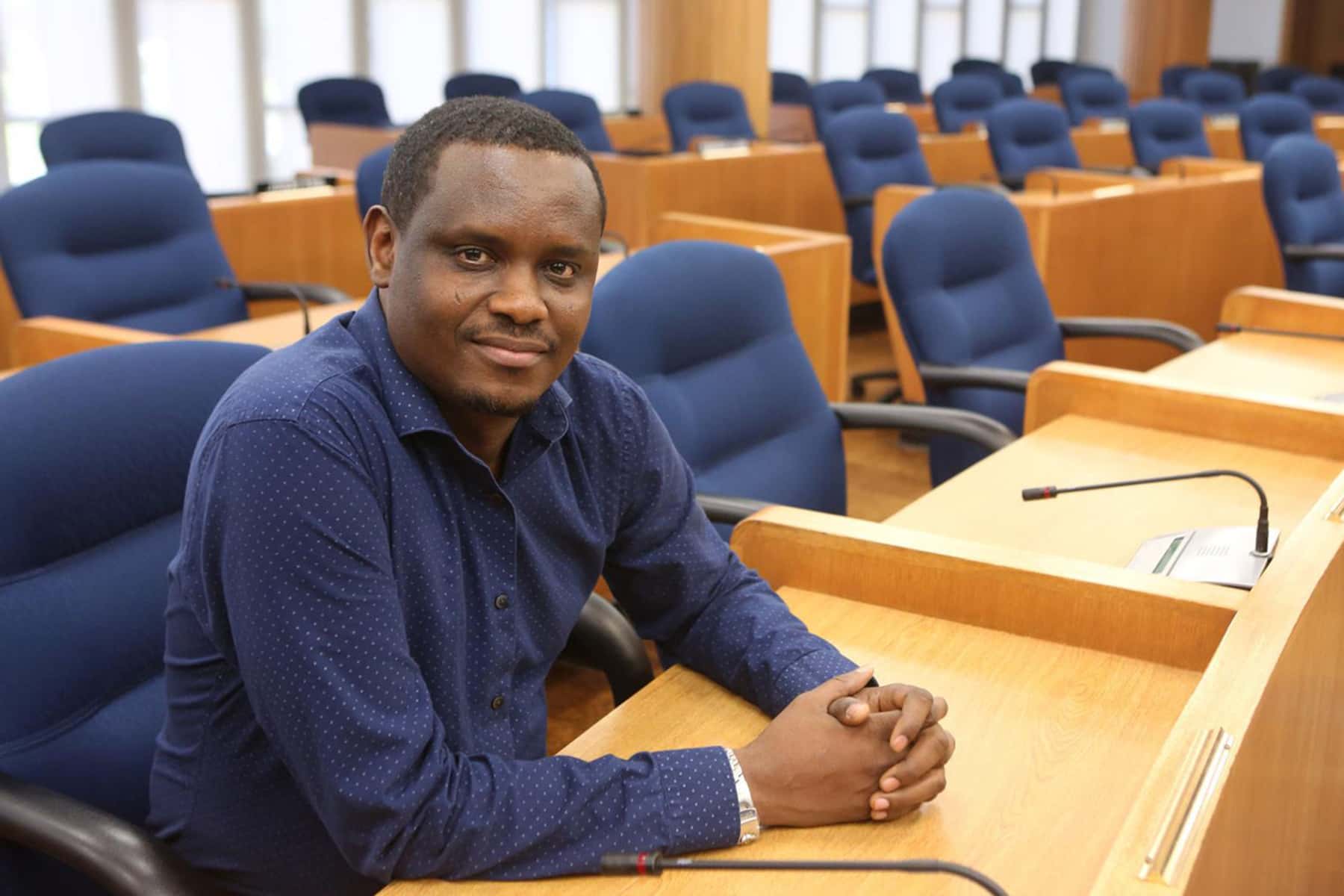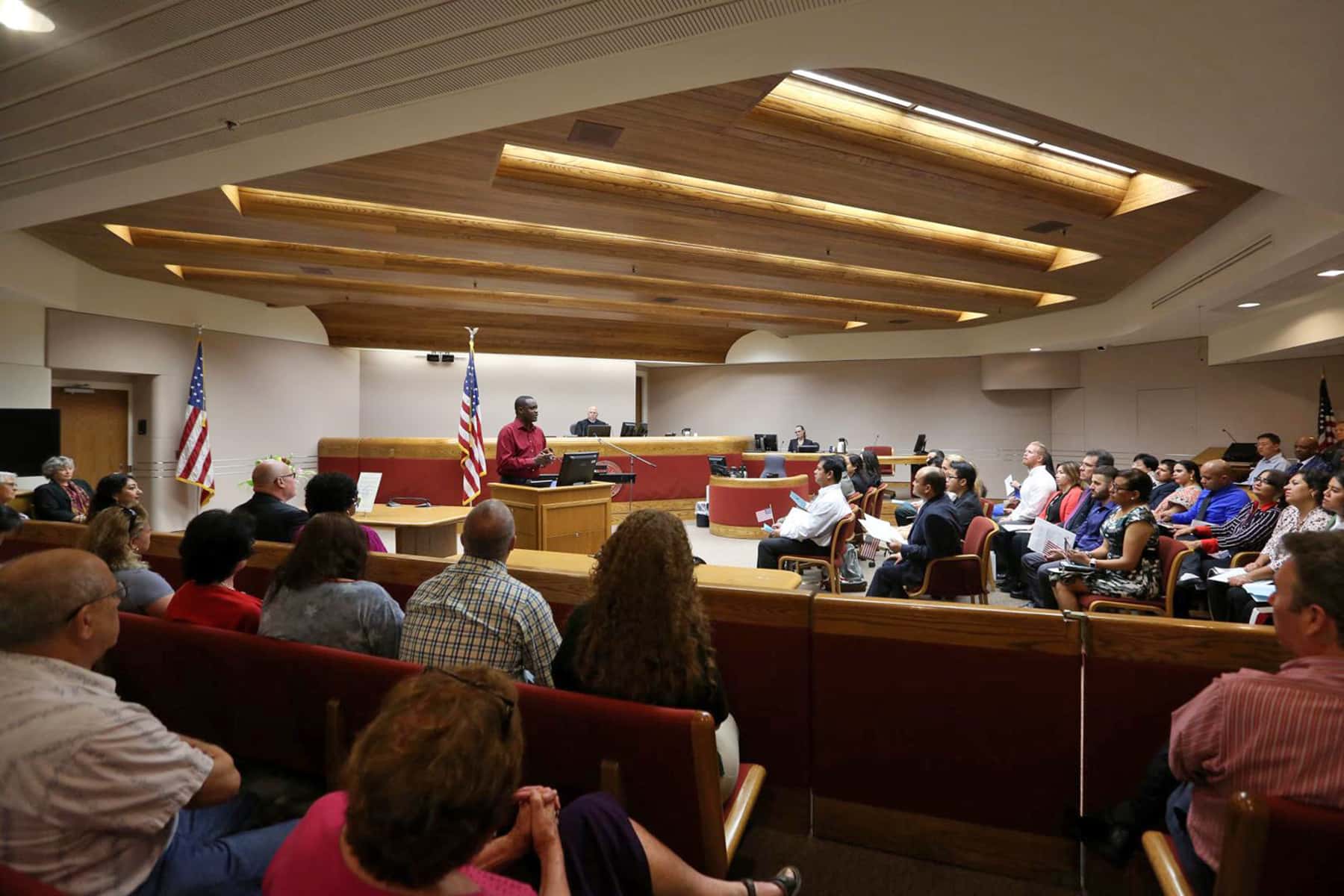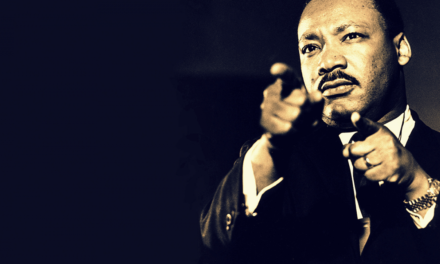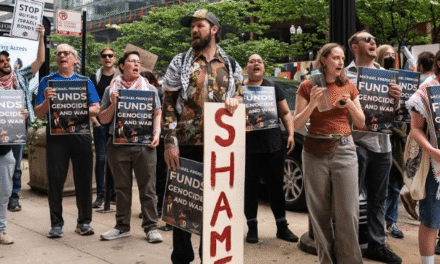
Samba Baldeh has never been easily deterred, he followed his curiosity from Africa to Madison and the City Council presidency.
Subsistence farming was the dominant way of life in the small village where he was raised, but at a young age, Baldeh decided he wanted to pursue another way of life.
“I know taking the challenge would give me a better product than running away from it,” said Baldeh, president of the Madison City Council, an information technology project manager at American Family Insurance and immigrant from Gambia.
Children in his village learned Arabic, how to read the Koran and how to pray, but there was no formal education. It was rare for children to attend a primary school about six miles away, but Baldeh’s curiosity led him to walk there and back each day. And when his family realized he would not give up, they allowed him to move to Banjul, the Gambia’s capital city, to live with his uncle and continue primary school.
“I had for some reason developed this curiosity or interest in what was so unknown to me,” Baldeh said.
He was about 8 years old. Three decades later and 4,700 miles away, Baldeh again followed his curiosity and, as a political novice, ran for City Council. He had no political connections in his east side district yet he defeated the incumbent.
In April, the City Council unanimously elected him president. As a city alder, Baldeh does not waver from his beliefs. Yet, as president, he has helped to soften the often combative relationship between Mayor Paul Soglin and the council.
Baldeh works to bridge the divide between local immigrant communities and civic life, but also between the city of Kanifing in Gambia and Madison via a sister city partnership. He has broadened the council’s perspective and is rooted in his commitment to improving the city.
“If I cannot change people’s lives, particularly those who are most impacted, then I don’t think I’ll have a good legacy,” Baldeh said.
From Choya to Madison
It’s easy to dissociate Baldeh’s childhood in Africa from life in the two-story home in east Madison that he shares with his wife, Fatou. Baldeh grew up wearing shoes made of car tires, drinking water from a well that was sometimes dry, and living away from his immediate family.
“I cannot imagine from where I grew up to sitting here now. It’s like day and night,” Baldeh said. “Not only distance, but also the development gap in terms of infrastructure, even basic stuff like water, electricity.”
The Gambia is the smallest country in mainland Africa with a population of 1.8 million. Located on the coast of the Atlantic Ocean, it is surrounded by Senegal and split, east to west, by the Gambia River. Ninety-five percent of the population is Muslim.
Baldeh was born into the nomadic Fulani tribe and lived in the remote village of Choya, with a population of about 50. His family lived on subsistence farming near a highway that cut across the country.
“A lot of people stopped by who were educated in beautiful cars that we never had, clean dresses,” Baldeh said. “I was really curious about how is it that we have these two different worlds.”
Baldeh’s birthplace lacked recordkeeping, but he believes he was born in 1971. Time in Choya is marked by the rainy season, the period when families farm what they need to live, and the dry season. His father died when he was about 4, and he lived with several uncles. Most of his family still lives in the Gambia, including his mother, who visits Madison once a year. From a young age, Baldeh learned to be self-sufficient.
“Out there, as soon as you can walk, you are all on your own. It’s really a tough environment,” Baldeh said. “That’s what we grew up knowing. We didn’t know any different. You have to grow tough, being able to face all of the challenges.”
His childhood taught him “self-protection” and fueled him with the “ambition to make the world better or different” than his own upbringing. But he said love and family surrounded him.
“Village is family,” he said. “Whatever village you belong to, everybody was family. You take care of anyone who comes your way.”
After attending boarding school in another remote village and sixth form, a two-year college preparatory program, Baldeh moved on to college to study education. His activist work during college in the Gambia brought him to Washington, D.C., for a Global Meeting of Generations conference, where he was connected to the student life coordinator at Madison Area Technical College.
After speaking with other conference attendees, Baldeh decided he wanted to pursue additional education, particularly in science and technology. He moved to Madison in 2000 to take computer science courses at MATC because of the connection he made at the conference. But an uncle, Sankulay Jallow, takes credit for convincing Baldeh to move to Madison.
“He’s a wonderful person, and I’m seeing him rising,” said Jallow, who still lives in Madison.
Baldeh returned to Washington, D.C., in 2016 as a guest of Rep. Mark Pocan at former President Barack Obama’s final State of the Union address. Jallow spoke with pride as he contemplated Samba’s achievements.
“Thinking about where Samba is born and see him here … that is so moving for me,” Jallow said.
‘The sky was upside down’
“Imagine living in a village of maybe 10, 20 people here and there, no electricity in the capital city,” Baldeh said. “(Landing in an airplane in New York), it looked like the sky was upside down because of all the electricity, lights and all that kind of stuff that basically I never seen growing up in Africa or even traveling around.”
Adjusting to a new culture and language almost stopped Baldeh. Baldeh left his family, friends from school and a thriving youth development nonprofit.
“To leave all of that and decide this is where I’m going to be for some time and make life whatever I am imagining it to be here, was a challenge,” Baldeh said. “It was a big struggle to be able to settle down.”
If it were not for the support of the immigrant community in Madison, Baldeh said he would have returned to Africa. Today, in addition to his work at American Family Insurance, he owns an IT consulting business and hopes to revive a restaurant that he used to own at West Towne Mall. He earned a degree in computer science from MATC and a project management master certification from the University of Wisconsin-Madison.
On a recent Saturday, Baldeh was working to wrap up a major project. He had been at the office for over 12 hours. Colin Maitland, IT solution delivery manager, worked with Baldeh on the 22-month long project and said Baldeh is a facilitator.
“He tends to take everyone’s opinion and ideas in mind before trying to move a decision forward,” Maitland said.
Oumar Keita, Baldeh’s coworker and friend of about 15 years, agreed.
“When the work is needed, he is there to step up,” Keita said.
Keita, who said Baldeh is like a brother, described Baldeh as an excellent listener, dependable and professional. They discuss the goings-on in the African community and see each other at an east side mosque.
Like his responsibilities on the City Council, Baldeh deals with a variety of people at his day job and takes charge when necessary. Keita said Baldeh is a leader and pursues his ambitions.
“He’s not a type of person who just feels content in one place. He likes to challenge himself and that’s what I like about him,” Keita said. “He has a passion and when you have a passion for something, more likely you are going to succeed.”
An unlikely candidate
Before Baldeh’s political career began, he was very involved with the African Association and worked to bridge gaps between immigrant communities and municipal services.
“He is not someone who will sit on the sidelines and comment,” said Jerreh Kujabi, Baldeh’s business partner.
Baldeh said he joined the 2015 City Council race in his east side District 17 because he wanted to do something about gun violence in the community.
“There’s something that people who are making these laws do not understand about the people who are victimized by the shooting,” Baldeh said. “I thought it was a problem of legislation. I thought the best way to approach it is not just advocacy, but that I should be at the table. I should try to be there and hopefully be able to give the perspective to really represent my community.”
As an African immigrant with no prior political experience or connections running in a predominantly white district, Baldeh was an unlikely candidate.
“I came out of basically nowhere in terms of politics,” Baldeh said.
Baldeh defeated incumbent Joe Clausius, first elected in 2007, with 50.6 percent of the vote. Baldeh said his drive to be elected, his organized campaign and support from the community helped him win.
“I put everything into it,” he said.
Ald. David Ahrens, whose District 15 borders Baldeh’s, said despite the odds, Baldeh won by “active will, work and effort, intelligence,” and by reaching out broadly to the community.
“He’s sincere, authentic and he’s not into being a lifelong politician who’s going to give people what they want to hear,” Ahrens said. “I think that is the source of his strength.”
Kujabi confirmed that Baldeh is a “no-nonsense” leader.
“I always joke with him that in politics sometimes once in a while you’ll want to pivot, not be straightforward about what you’re thinking, but that’s not his style,” Kujabi said. “What he’s telling you to your face is what he’s thinking.”
As the District 17 representative, Baldeh has pushed for community space in the district. He proposed an amendment to the 2019 capital budget for a “library plus” — a traditional library with wraparound community services — in Reindahl Park called the “Imagination Center.”
“If you don’t provide these services, this is what leads to each community being on their own and, as a result, feeling alienated,” Baldeh said. “Where you live is your country and that’s where you should try and work hard to make it better.”
Baldeh also supports community efforts to create an African Center for Community Development in his district to offer resources for immigrant and low-income families.
Role model for civic involvement
Baldeh represents many firsts for the City Council. He was the first African immigrant to be elected, the first Muslim to be elected and, along with District 14 Ald. Sheri Carter, he’s part of the first council president/vice-president team made up of two people of color.
On the City Council, Baldeh has raised the profile of immigration issues and the concerns of Madison’s immigrant community. He organized the well-attended Know Your Rights Forum following the 2016 presidential election amid fears of President Donald Trump’s administration.
“Things like this would probably never have happened without having people like myself being elected,” Baldeh said.
He may be far from his home country, but he brings Gambia to Madison through a sister city partnership with Kanifing, its largest city. Kanifing is rebuilding its municipal government after the 2017 fall of former dictator Yahya Jammeh’s 22-year regime.
Baldeh last week introduced recently elected Kanifing Mayor Talib Ahmed Bensouda and Councilor Sulayman Jammeh to Madison and its municipal services and local businesses. They had meetings at Metro Transit, the StartingBlock business incubator and with Mayor Paul Soglin, Dane County Executive Joe Parisi and District Attorney Ismael Ozanne. Bensouda said he looks to Baldeh as a mentor.
“For the first time, Gambians are able to participate freely without fear. People like myself would never have run for office in that climate,” Bensouda said of the old regime. “(Baldeh) has been showing us how a democratic local government that serves its people runs.”
In Madison, Baldeh’s presence as a city official has introduced many people to the local government system, and he hopes to encourage others to get involved in local politics.
“Even if you don’t win the actual elections, now you have become part of the process,” Baldeh said. “Now you have a voice and now people can listen to you. Now you are at the table.”
Kaba Bah, vice president of the Madison-Kanifing Sister City Committee, said Baldeh is “giving a voice that’s been void.”
“If you’re not here, chances of you either being misrepresented or not represented is even bigger than you being represented, so it’s critical to take part in it,” Bah said at a recent City Council meeting. “(Baldeh is) definitely taking a lead to opening up that path for other people.”
Before meeting Baldeh, Aslam Rakhangi did not know the position of alder existed. Originally from Bombay, India, Rakhangi met Baldeh through a local mosque. As the board chair of the Madison Cricket Club, Rakhangi also worked with Baldeh to secure funding for improvements at the cricket fields in Reindahl Park.
“When I think about doing some public service, I think he’s like a role model to see how he has come in as an immigrant and adapted to the community service life with his work,” Rakhangi said.
Rakhangi respects that Baldeh is “approachable,” “down to earth,” humble and a good listener. He also points to Baldeh as an example for his three daughters.
“I have kids and I can show to them and say, ‘You can do things like that,’” Rakhangi said. “I think it’s very inspiring.”
Carter said Baldeh and his life experiences have broadened the horizons of the City Council. She said Baldeh is approachable, easy to talk to and willing to “come to your meeting to support you.”
Carter said their election to council leadership posts in April represents how the legislative body and Madison have evolved.
“It shows we are becoming more comfortable with diversity,” Carter said, but adding Madison has a lot of room for improvement in this area.
Unity over division
As an elected official, Baldeh said he believes in leading with decency. Demonstrating his commitment to maintaining decorum at meetings, Baldeh shut off Soglin’s and Ahrens’ microphones during a heated exchange over the Madison Water Utility’s $6 million deficit on September 4.
“I just think that no matter how much you disagree, at the end of the day, if it was not what we believe, we never would have met at that point to disagree,” Baldeh said. “The fact that we meet to argue at that level, it has to do with all our commitment to the people we are representing, so let’s not be disrespectful in that process.”
Carter said that exchange illustrated Baldeh’s “calmness” as a leader.
Two years ago during a marathon City Council meeting over funding a study of the police department, Baldeh called out Police Chief Mike Koval’s behavior and said it was “unacceptable.” He said he felt unsafe having Koval seated behind him, armed with his service gun.
“I can be very confrontational if I realize something very serious and important is at risk,” Baldeh said.
A few days prior to to the meeting, Koval published a blog post criticizing council members for considering spending $400,000 to review the MPD’s operations. Council members responded negatively to Koval’s actions during the meeting.
Koval said that while Baldeh’s comment was “off-putting” in the moment, he and Baldeh have found “common ground.”
“He is a passionate advocate in terms of inclusivity and diversity and specifically, a zealous advocate for Muslims and understanding the plight of immigrants,” Koval said.
Baldeh said his relationship with Koval is “back to how it’s supposed to be.”
“I never hold things against people,” Baldeh said. “I’m not carrying that anger along with me. I let it go. I tell you what I feel, we talk about how we feel and we move on.”
He said one of the reasons he ran for a City Council leadership position was to repair the rift between alders and the mayor. He implemented a system where alders can bring up issues to the mayor and chief of police at a weekly meeting, “so there are no surprises.”
“As leaders of this community, it is our responsibility that the leaders come together. We can disagree and shout with each other, but if you do it within the context of this room, it’s better than we go on television or a microphone and keep doing that,” Baldeh said.
Soglin said the Baldeh-Carter leadership team is as “good as it gets.” Referencing Baldeh’s commitment to community services, he said the leadership team is prioritizing social justice and equity initiatives.
“It’s not just this year, but I think the impact of Baldeh and Carter being the officers is going to continue for quite a few years in making sure that our actions are more aligned with our mouths,” Soglin said.
Traditionally, council leadership positions are one-year terms. Baldeh’s time as council president will likely end in April amid expected shifts on the City Council and in the mayor’s office. Three alders resigned over the summer and one recently announced he is not running for re-election.
When asked if he has future political aspirations beyond the council, Baldeh said he didn’t know. “Politics is very fluid,” he said. He looked into running for mayor after being pressed by several people, but he said that will “very likely not be the case.” If he did run, Baldeh said he would want to resign from the council leadership position.
At this point, Baldeh said he plans to run for re-election as District 17 alder. He is committed to seeing the Reindahl Park Imagination Center and an African community center come to fruition, along with starting other initiatives such as a 311 information program.
“For me to be the best scientist to a certain degree is up to me, I just pursue that,” Baldeh said. “I don’t know what’s next in terms of politics, but I know I’m very interested in public service and I will always do that until I can’t really do that.”














